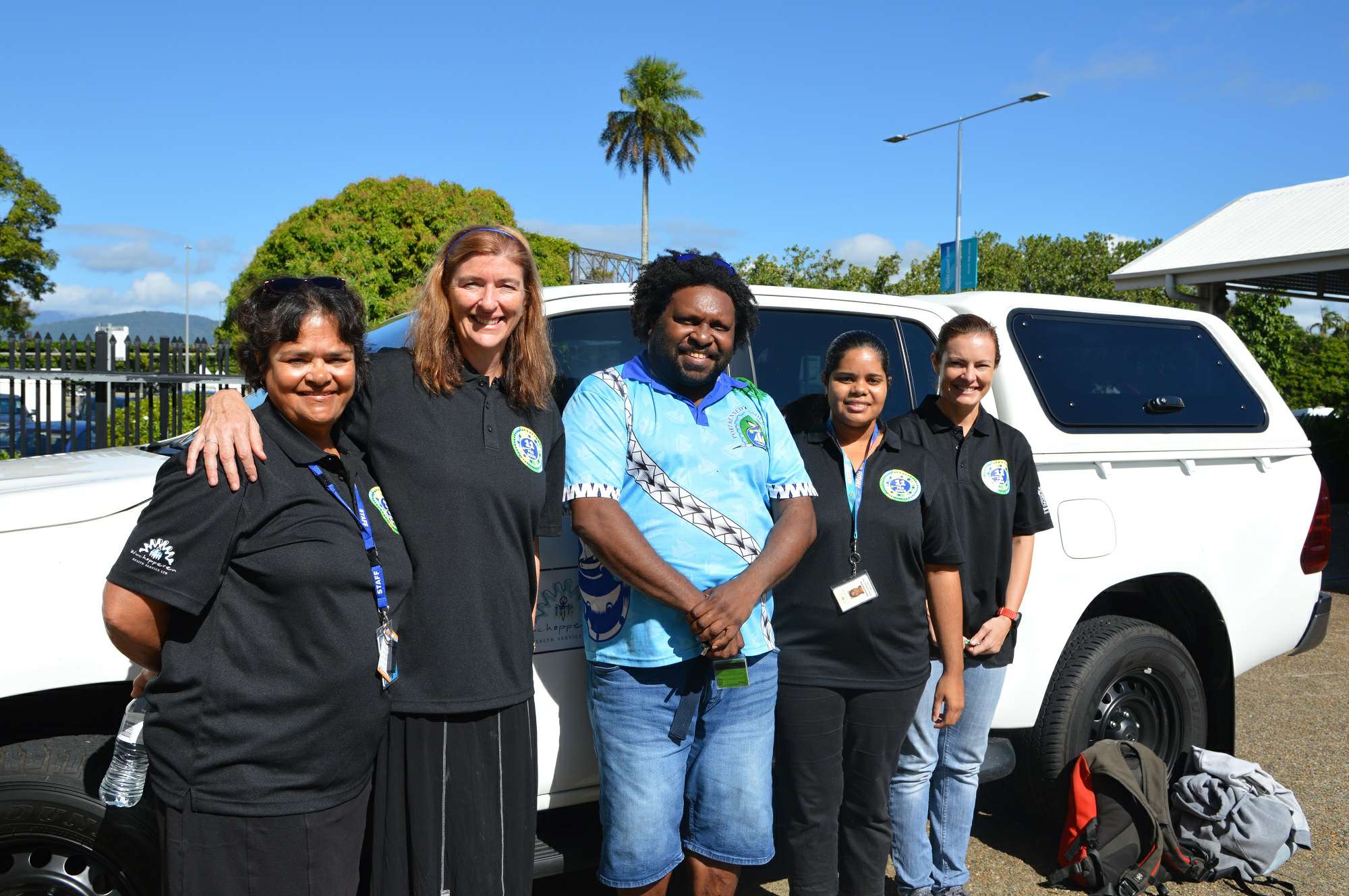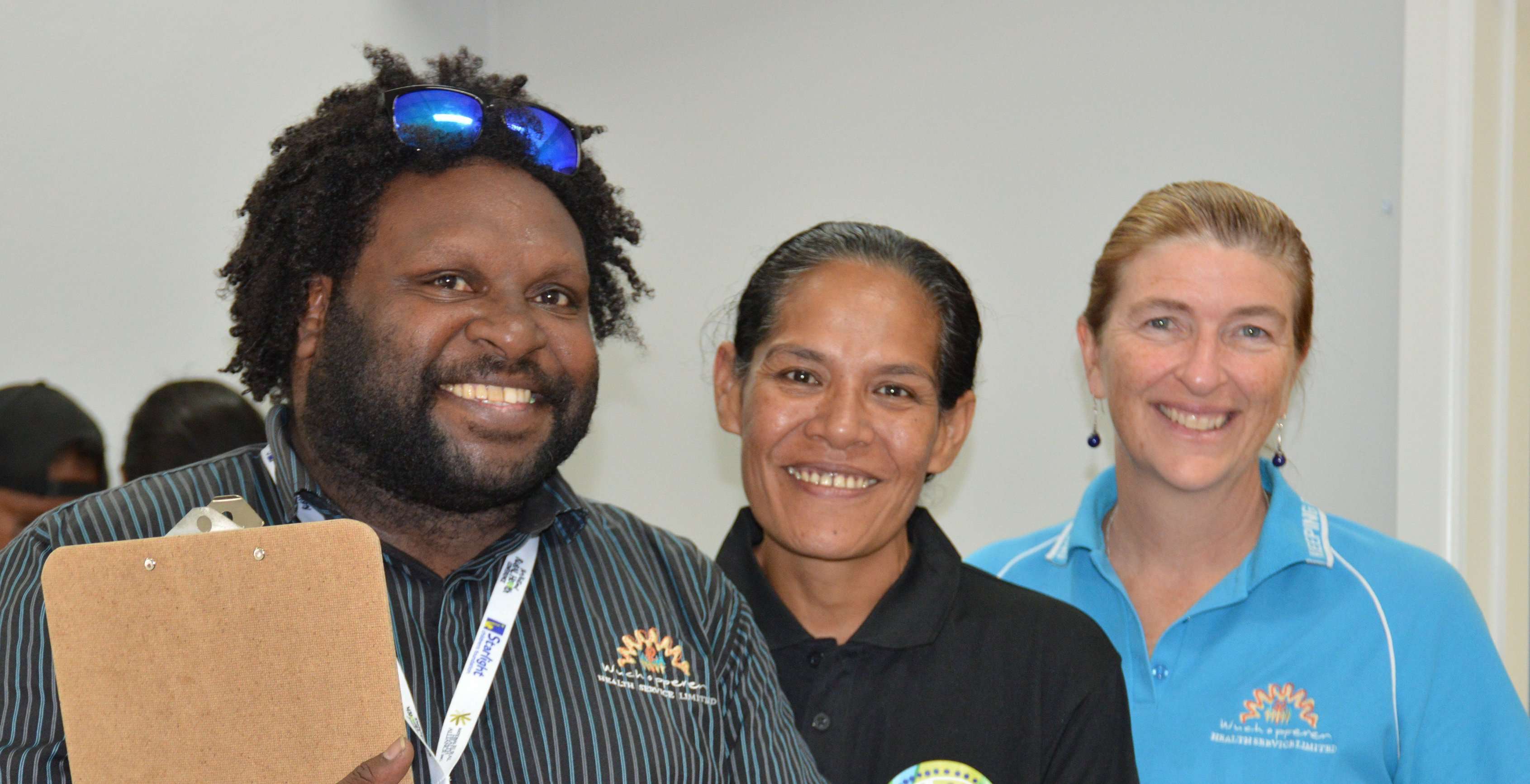After decades working as a doctor in Northern Australia, Dr Jacki Mein’s journey to becoming an RVTS registrar – and ultimately RVTS Chair – had a surprising start, writes Patrick Daley.
 Dr Jacki Mein (second from left) with her colleagues at the Wuchopperen Health Service.
Dr Jacki Mein (second from left) with her colleagues at the Wuchopperen Health Service.
Photo courtesy Wuchopperen Health Service.
With a love of the ocean, Dr Jacki Mein always wanted to be a marine biologist.
While her career path ultimately was a medical one, it is no accident she now lives in Cairns – where she is Director of Medical Services for the Wuchopperen Health Service, a community-controlled Aboriginal health organisation.
The road to Cairns has included two decades of experience as a remote doctor, from Broome to Darwin and the Top End through to Cape York.
“I don’t think I’d make a huge career change now into marine biology” she laughs.
“But I really love living near the Great Barrier Reef. I get out on the Reef when I can and I’m a local surf lifesaver here.
“A medical career can give you so many choices, and being able to live in some great locations has been a real privilege.”
After completing her medical degree in 1990, Jacki did her intern years in her hometown of Melbourne and worked in infectious diseases at Fairfield Hospital. One of the consultants there set her on a path that would change the direction of her career.
“He said that if I had an interest in infectious disease I should go to Darwin – so I ended up moving there in 1994 and doing sexual health work, which I loved” she says.
“Darwin at that time smacked of the last frontier. I preceded the opening of the first McDonalds there by about six months. It’s not my marker of urban civilisation, but it was for a lot of people because there was a lot of excitement about it back then!
“I found the medical work in Darwin amazing, and it was a great place to work and live. I really enjoyed rolling out of bed and pulling on a pair of shorts to go to work.
“I guess that’s why I’ve stuck to northern Australia – it’s a really beautiful place.”
The exposure to Aboriginal health in Darwin also had a big impact on her.
“The thing that struck me was seeing diseases like donovanosis that you don’t really see in developed countries, but were reasonably commonplace up there. It was like going back 30 years” she says.
“I also started to realise just how difficult the journey was for Aboriginal people to access care, for all sorts of different reasons.
“Some barriers were about the healthcare environment itself.
“Royal Darwin Hospital is modelled on a hospital in Canada, so ironically (for Darwin) it has big concrete window protectors to keep off the snow. It also rises like a giant monolith out of the flat land around it, and some Aboriginal people found it very intimidating.
“I remember bringing in a young Aboriginal patient from a remote community with her grandmother, and as we got closer to the hospital they became silent – it was scary to them.
“It also had Arctic air conditioning, and they only had shorts and t-shirts on!
“So there were huge barriers to care that weren’t only about healthcare access – it was also about how frightened Aboriginal people were to access the healthcare environment.
“I became really interested in what we could do to help overcome those barriers.”
After one of Jacki’s patients left a packet of tablets for chlamydia at the door of her clinic – just minutes after she had handed it to him – she realised a different approach was needed.
“Clearly, I hadn’t got the message through that he needed to take his medication. Even though it was free and came with instructions, he just wasn’t taking it” she says.
“So I changed my approach. While my patients were in the practice I would ask them to take the tablets there and then.
“That was a crystallising moment for me – that there were also population issues I hadn’t even thought about that were having an incredible impact on Aboriginal people’s ability to benefit from care.”
Another patient who had travelled to Darwin from a remote Aboriginal island community convinced Jacki that change was possible.
“This girl had been put on a plane from her community, caught a taxi from the airport, and got to the sexual health clinic where I was working.
“She had what, in those days, was a difficult to treat medical condition. I remember telling her it was important that she stick with the treatment, and that she could do it – and she came back two months later and was actually cured!
“That was one of the key moments in my journey as a doctor – the importance of establishing that relationship with your patients and being positive about how they can take control of their own health.”
Jacki says one of the biggest differences in improving Aboriginal health has been the advent of Aboriginal Health Workers.
“Theirs is not the easiest of careers and there’s a fair way to go to recognise Aboriginal Health Work as a career pathway into Medicine, Nursing and Allied Health – but it’s improving” she says.
“For a doctor in a rural community, there’s always the patient in the local shop stopping you near the frozen peas and saying ‘the elbow still hurts doc’, but for Aboriginal Health Workers it’s 100 times harder because they never stop working, and they carry the expectations and hopes of their people on their shoulders.
“I remember going to see an Aboriginal woman in prison, who was very reluctant to have an intimate examination. If it wasn’t for the Aboriginal Health Worker who was with me, it would have been impossible to have her agree to it.
“You don’t get good access to care without people like that – they do an amazing job.”
 Jacki with her Wuchopperen Health Service colleagues.
Jacki with her Wuchopperen Health Service colleagues.
Photo courtesy Wuchopperen Health Service.
Sometimes small changes can make a difference in public health outcomes too.
“Back in the 2000s I did a regular clinic at a minimum security prison in Broome – mostly people who had unpaid fines and civil breaches” she says.
“Each Christmas they had a big lunch – and there were always more people in prison that day than there were supposed to be, as some would sneak in as a prisoner for the day to get the lunch!
“I had the opportunity at the prison to implement some changes, like making sure everybody was up-to-date with their immunisations.
“The food was also fairly stodgy and not what people were used to eating outside, so we worked to make the options a bit lighter instead of the unlimited bread and butter, porridge and that sort of thing.
“A prison riot in Perth had meant that exercise equipment had been taken out of all WA prisons, so we tried to bring back some exercise options too – luckily there was an oval across the road so we advocated for prisoners to be able to use this, just to kick a footy around.”
Jacki became involved with RVTS in 2016, when she was working with Apunipima Cape York Health Council in Cape York and supervising a young GP registrar who happened to be on the RVTS training program.
“I became more interested in the program as my registrar went along, and when she completed her training I approached RVTS and asked if I could go through the program too” she says.
“I was conscious that, although I had significant experience as a doctor, it had become increasingly important that if you wanted to work as a GP and a GP Supervisor you needed to have your Fellowship.
“I really liked the RVTS model – it was a flexible approach to learning that ticked all the right boxes.
“As a single mother with three kids, the clincher for me was that I could train where I worked. Other training programs would have required me to sign up knowing that I could possibly be moved.
“RVTS does a great job of being able to strike the balance between working rurally but getting quality supervision and support.
“I had a supervisor who was very dedicated and experienced, and like clockwork on a Thursday evening we’d have a session on the phone which was often a bit of a debrief about what had happened that week.
“My supervisor also did teaching visits and would provide me with lots of constructive feedback, so it was great support on a number of different levels. I always knew that she was there for me.
“RVTS was really good at not only providing training in the required ‘mainstream’ topics needed for GP Fellowship, but also in delivering training that focused on my work serving an Aboriginal population with specific health needs.
“The other thing I really liked were the face-to-face workshops – they were a great way to see that other doctors were in the same boat, and there was lots of support around you.”
When Jacki’s RVTS placement in Cape York became untenable with small kids and frequent travel, she relocated to the Wuchopperen Health Service in Cairns. While it was still an Aboriginal health service, the urban demographic made for some different presentations.
“One of my first patients – a woman in her early 20s – came in to see me, and she was very worried about the wrinkle lines on her face” she says.
“She was wondering whether she needed botox.
“This wasn’t in my area of expertise, because no-one in Cape York had ever asked me that – so I said I’d have to check out the options.
“While she was there I checked her for everything else. She had early diabetes and some other health issues that needed treating, so the ‘spread the net wide’ approach paid off.
“But it underlined to me how different cultural groups can be, even within the wider Aboriginal community.
“I had been used to the Aboriginal people of Cape York, many of whom try not to visit the doctor unless they absolutely have to! They also have an incredible pain tolerance – I had one guy who came in after five days with a very swollen hand. He had fractured every bone in his hand and didn’t really think it was important to come in…until he couldn’t use it very well.
“It was really interesting to see how different those individual cultural groups can be.”
Jacki was elected RVTS Chair in 2020 – and the impact of COVID-19 made it an interesting time to be heading up a remote GP training organisation.
“Thankfully, RVTS was well placed to move everything online when COVID hit, because by and large remote learning is a key part of what we do anyway” she says.
“One of the great things about RVTS is that, while we are relatively small, we are agile – and we can respond to our registrars’ needs as they emerge.
“RVTS is more than just a training organisation. We really believe in you as a rural and remote GP, and we work really hard to support you.
“We also recognise that family is so important to our registrars when they go remote, and having family come with you to a workshop means an awful lot.
“You need to go the extra mile to turn out high quality, committed and passionate rural and remote GPs, and RVTS does that in spades.
“It’s an organisation that I passionately believe in.”